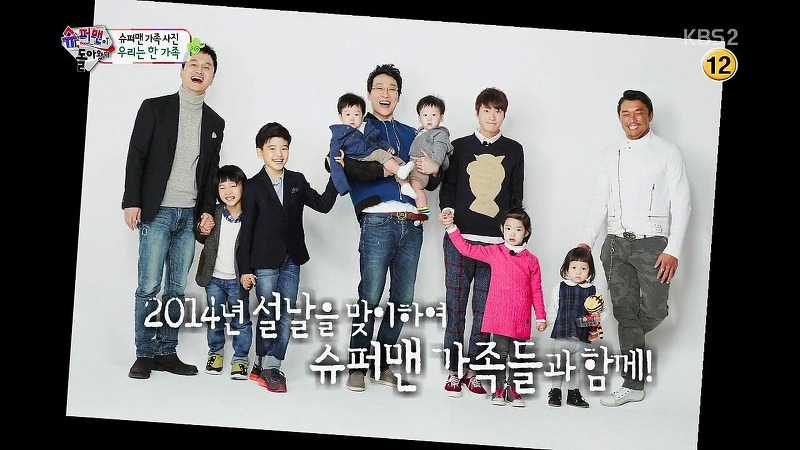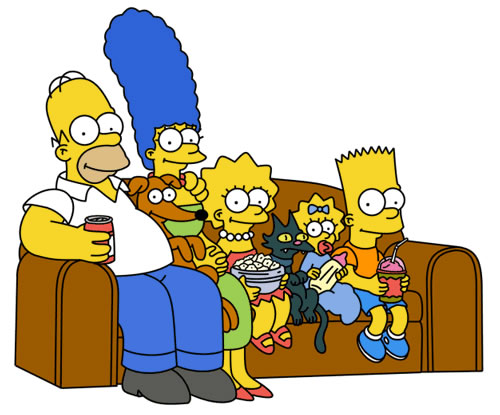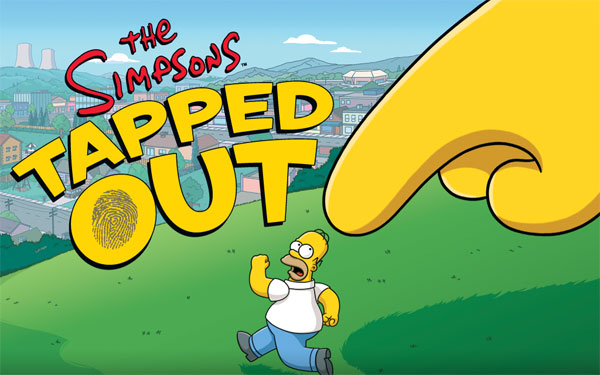Look, Ideal Fatherhood in South Korea is in here: Korea Reality Show 'The Return of Superman'

As a Korean student who is taking the TV Criticism class, almost all answers towards the question ‘Have you watched this show?’ Are, ‘No’. However, it doesn’t mean that I didn’t watch the television program at all. Even though I am not a TV person compared to the average Korean, I love to watch and analyze the Korea TV show and drama, like we are doing in the classroom. The reason why I’m interested in Korea television program scholarly is not only that I am a South Korean, but its popularity is also viral that there is a term that explains this phenomenon called 한류 (hallyu, Korean Wave).
Entertainment in South Korea particularly have been getting a huge popularity in Asia region. For specific examples, TV series Jumong attract over 80 percent viewership ratings in Iran (Song, 2011), TV series Dae Jang Geum had over 180 million viewers from China (Tsai, 2005), and the TV series Winter Sonata brought 18 billion dollars from Japan alone, without counting the increasing Japanese visitors and their economic effects (Lee, 2005). This wide popularity through the Asia makes me more interested in the TV programs in South Korea. However, I can easily find the sources and articles that deal with ‘why the programs in South Korea appealed so well to the Asia region?’, whereas it is really hard to find how TV programs contains the culture or ideology of South Korea. This simple question made me to work on the blog that tries to explain the ‘Korean’ culturally through the TV program.
One of the trends that I have interests in the Korean TV show is the male celebrities and their kids. Starting from the 2013, it became a main trend throughout the nation. On these TV Shows, ‘famous’ father and their kids spent time by traveling and playing together, and people are crazed about these programs. Why this type of reality program became one big trend in Korea, which makes Korean addicted to them? What is the cultural background that makes this type of program coming out? For answering those questions, I picked and analyzed the Korea reality program ‘The Return of Superman’, which is the program that 4 male celebrities (Tablo - Rapper / Choo sung hoon - Martial Artist and Model / Lee Hoi Jae - Famous Comedian / Jang Hyun Sung - Actor) raise their kids without mom within 48 hours in every week. The ideal image of true ‘fatherhood’ is changing in the Korea because of economic development, improved status of women, and spreading Christianity. Formed new ideal image of fatherhood is dreamed of Korean in all ages, whereas it is too hard to be achieved in real families because of various reasons. ‘The Return of Superman’ helps Korean audience to feel and watch the ideal fatherhood that is dreamed of but cannot be achieved due to the limited leisure time of fathers.
Before talking about the elements of ‘The Return of Superman’, explaining about the cultural and social background of Korea in terms of ‘Fatherhood’is essential to understand the thesis of this posting. Countries in East Asia like China, Korea or Japan interrelated with each other culturally because of geographical closeness. Japan and Korea were influenced by the China’s Confucianism, and China and Korea are invaded and was the colonies of the Japan (Shwalb, Nakazawa, Yamamoto & Hyun, p. 341). In the Confucianism, ideal family must have the “strict father, kind mother”. In other words, the father should take the disciplining role, whereas mother should take the emotional role, which makes the harmony in the family. And in Korea, Confucianism was adopted more genuine than in Japan since the Joseon Dynasty (1392 – 1897), which helped traditional Korean father to have more power over his wife and children. However, this traditional ideology was collapsed and rebuilt because of the radical change throughout the Korea society, such as the annexation of Korea by Japan and independence (1910 – 1945), rapid economic development, the spread of Christianity and increased status of women. According to the Dong A Ilbo, one of the major newspaper in South Korea, said “Absolute authoritarian and strict father no longer exists in Korea” (2005). Instead, new image of Korean father is emerging in the South Korea society. This is the mature personality who “loves, counsels, advices, and is a friend to his children; competent with finances; is family centered; not only do the house chores, but also satisfy the emotional needs of his family” (Shwalb, Nakazawa, Yamamoto & Hyun, p. 359). But the problem is, most fathers in South Korea could not fulfill this image because of their excessive work.
One of the Psy's songs 'Father' has touched lyrics that exemplifies the burden of Korean father.
In South Korea, father is a primary wage earner, and haven’t enough time to take a rest because of authoritarian corporate culture (Olson, 2008). Even though the government tried to regulate work hours by establishing the five-day workweek policy, they still did not have enough leisure time to spend, which means, they cannot spend time with their kids. Kids are busy, too. Competitive environment that social standing is heavily related to the prestige of the college led kids to start their academic training in early age instead of playing (Shwalb, Nakazawa, Yamamoto & Hyun, p. 351). Due to this complex reason, 42% of the children spent less than 30 minutes daily with their father, even though 87.7% of the children needs a father who does the active involvement with them (Shwalb, Nakazawa, Yamamoto & Hyun, p. 359). It is quite ironic that both father and kids want to spend time together, but they couldn’t. Consequently, fatherless – in other words, father as just a breadwinner – is a common situation in Korea.
With this current situation of South Korea in mind, ‘The Return of Superman’ shows the ideal image of fatherhood that is deficient in Korean society, which works to the audience as like a ‘fairy tale’. In the first episode of ‘The Return of Superman’, male celebrities are depicted as a common father in South Korea who is busy to spend time with their kids. They all confessed at first that, 'I am looking forward to spend time with my kid because I was too busy to play enough with my girl/boys'. In the first two episodes, kids were crying, or expressing an uncomfortable feeling about mother’s absence. Clumsy behavior that was made by a male celebrities as a father help audiences of all ages to sympathize in some ways. Male audiences who have siblings can understand what they felt difficulty with, and identify those celebrities with them. Why? They are poor at dealing with their kids, like most fathers in Korea do. Young audiences, including adolescence and twenties, see the kids and celebrities and think about them and their father. In the first episodes, the caption during the show depicted them as ‘immature, first step to their kids, and clumsy’. For specific examples, when the actor Jang Hyun-sung made the first breakfast for their sons, he scolded his son who asked Knife for spreading the jam on it, and every response he made towards his sons are coming with the caption named ‘건성 (careless)’, which represents the image of a stereotypical Korean father who is not used to deal with the needs of their children (Episode 2).
 |
| Caption means: Joon Seo cries because he think his fault made his father hurt |
 |
| Caption means: He concealed his wound because of worries that his son may hurt about it. |
However, as the episode goes on, the audience can see the changing father's behavior when handling their children. As the time that fathers spent with their kids grows, the relationship between celebrities and their kids becomes more fruitful, and fathers start to hear the voice of their siblings carefully, which isfitted to the ideal image of fatherhood in South Korea. For example, in the episode 12, when the actor Jang Hyun-sung was wounded by his son Joon Seo during playing the ice skate, he kept saying to Joon Seo that “it is not your fault” because he doesn’t want to make his son hurt about the fact that his fault make father wounded (Episode 12).This showed how the male celebrities are changed into the ideal image of father as Koreans dreamed of, and audiences have been living vicariously through the ‘The Return of Superman’, like “It would be great if our family can spend time together like that” or “me and my kids should build relationship as celebrities do so”, which leads ‘The Return of Superman’ to get a highest viewership in the Sunday night time, which is defined as a prime time slot.
To sum up, reality TV Show ‘The Return of Superman’ got a sympathy from audiences by showing the image of ideal father and ideal father-child relationship. This sympathy led the popularity throughout the South Korea. ‘The Return of Superman’ has highest viewership in the Sunday night time, which is defined as a prime time slot. On the other hand, the fact that many Koreans couldn’t spend time with their kids like celebrities did make me sad because that is the reason why ‘The Return of Superman’ got popularity in South Korea. Even though I love this program, I hope that this type of program becomes one of the many cable programs in the age that I have my siblings, instead of getting near 11% viewership in one nation.
References
Song, Sang-Ho. "Korea’s mark on an expectation-defying Iran." The Korea Herald [Seoul] 10 Aug. 2011: n. pag. The Korea Herald. Web. 21 Mar. 2014.
Tsai, Ting-I . "Korea swallows its pride in Chinese kimchi war." Asia Times Online [Hong Kong] 22 Nov. 2005: n. pag. Asia Times Online :: China News, China Business News, Taiwan and Hong Kong News and Business. Web. 22 Mar. 2014.
Lee, Diana. "Winter Sonata Fever." Winter Sonata Fever. N.p., 31 Jan. 2005. Web. 23 Mar. 2014. <http://uniorb.com/ATREND/Japanwatch/wsdramafever.htm>.
Shwalb, David W., Jun Nakazawa, Toshiya Yamamoto, and Jung-Hwan Hyun. "Fathering in Japan, China, and Korea." The Role of the father in child development. 5th ed. New York: Wiley, 2010. p.341-387. Print.
DongA Ilbo (2005, May 12, p.A9). The shrinking Korean man.
Olson, Parmy. "The World's Hardest-Working Countries." Forbes. N.p., 21 May 2008. Web. 26 Mar.2014. <http://www.forbes.com/2008/05/21/labor-market-workforce-lead-citizen-cx_po_0521countries.html>.
The Return of Superman, Ep.2, “They’re Just Like Me”, Aired Dec, 15, 2013.
The Return of Superman, Ep.12, "If we haven't met then...", Aired Feb, 9, 2014.
The Return of Superman, Ep.12, "If we haven't met then...", Aired Feb, 9, 2014.









